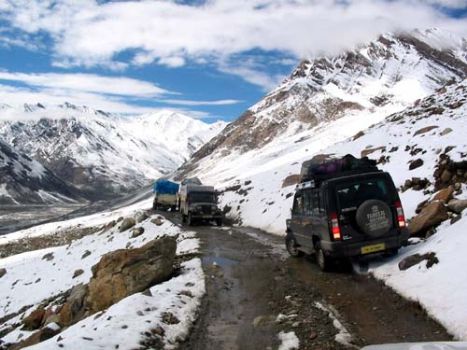
-
Published: 09 April 2023

Traversing the Sabzak Pass in Afghanistan is treacherous. But for travelers in distress, one innkeeper, who personifies Afghan generosity, is there to help — with a cup of tea, a meal, or a car repair.
Edited by |Juls McMahon
Asia section - CJ journalist
Afghanistan – April,9,2023
The hotel is perched on the side of a mountain blanketed in snow. The ice-slicked road outside is treacherous. It stretches for miles in either direction through jagged peaks as it winds around the edges of cliffs and dips past piles of boulders left over from frequent rockslides.
Ever since record-breaking winter weather seized Afghanistan this year, Mr. Bastani has assumed an outsize role in this desolate stretch of highway in Badghis Province, the only land bridge opens year-round that connects cities across northern Afghanistan to the west.
As the temperatures plunged, thousands of parents with sick children flooded the pass to reach the region’s only well-equipped hospital, in Herat. Young men took to the road to begin their migrant journey into Iran in search of work as their families struggled to buy food and wood to warm their homes.
But the trek across the 20-mile stretch of the Sabzak Pass — which is covered in snow six months of the year — is often as dangerous as the troubles being fled. Cars slide from the road in flash storms. Rusted snow chains, held together by twine, snap off tires. Piercing wind topples over trucks, blocking the pass for days.
For these and many other distressed travelers, Mr. Bastani’s hotel has become a lighthouse of sorts.
Every trucker and taxi driver who frequents the pass knows to call him when they find a vehicle that has run out of fuel or slipped off the road. He delivers food to the passengers, calls the closest mechanic, and sends a local taxi driver to bring them to the comfort of the hotel.
In the summer of 2021, the Taliban took the Afghan capital at a speed that shocked the world. The consequences have been far-reaching.
Under Taliban Law: The restrictions and the economic fallout brought on by the Taliban’s takeover have thrown many women into a new era of diminished hopes.
A Devastating Decision: Since the Taliban banned women from aid work, many groups have suspended their operations in Afghanistan, depriving the population of critical resources and support.
Yet Another Ban: The Taliban administration recently added the U.N. to the list of organizations female Afghan employees are barred from working for; the decision puts at risk one of the country’s last sources of badly needed aid.
How Afghanistan Eats: From once-bustling eateries in Kabul to the frozen mountains shadowing the capital, Afghans are having to learn how to survive on less food.
His efforts illustrate that in times of crisis — civil war or foreign invasion or government collapse or an economic crisis like that gripping Afghans today — the kindness of strangers often holds the country together, an informal social backstop.
The small guesthouse, known as the Sayed Abad Hotel, sits on a small gravel strip at the center of the pass. Behind it is a small village, whose mud-brick dwellings are home to about 80 families. Next to the hotel are a few shops selling dust-coated cans of energy drinks, an outhouse with a rickety wooden door, and a shed of kindling that village children collect each morning.
As the temperatures plummeted earlier in the year, congregating in the kitchen each morning had become their daily routine — looking for warmth as much as the company.
The camaraderie was a welcome change for Mr. Bastani. When he arrived in the area a year ago and asked to lease the hotel, the men in the village were skeptical of the stranger. But Mr. Nabi, the hotel’s original owner, was also eager to help run the business.
For much of the past 20 years, the pass had been maintained by about 1,200 Afghan soldiers, tasked by the Western-backed government with protecting the vital route from the Taliban.
The soldiers oversaw the highway’s transformation from a dirt path to a paved road and assisted those who ran into trouble trying to traverse its unforgiving terrain. But when the Western-backed government collapsed, so too did the safety net those soldiers provided. Practically overnight, the hotel became the round-the-clock headquarters for roadside assistance.
“The government was solving people’s issues in the past,” Mr. Nabi said, adding that the Taliban administration has stationed far fewer of their soldiers along the pass.
After he took over running the hotel from Mr. Nabi, Mr. Bastani assumed the role of the so-called Keeper of the Pass, a guardian for everyone who dares cross it. Mr. Bastani said he relished the role, so different from what his life had been.
He spent his late teenage years fighting for an Afghan warlord who encouraged his troops to kill and steal at will, then deserted his comrades in search of work in Iran, where he became addicted to drugs. His new life, helping others along the road each day, seemed to offer him a sort of redemption.
His eagerness to serve has injected new energy into the surrounding village that — much like the pass — had languished since the Western-backed government fell and the economy tanked with it.
The 700 trucks that once had traveled the road each day shrank to around 300, squeezing the shopkeepers’ business. Shepherds lost their herds to drought and then freezing weather. Village elders suddenly struggled to collect enough leftovers to feed the community’s poorest.
But for the thousands of travelers braving the unforgiving pass each week, there is Mr. Bastani and his warm kitchen and his cell phone always at the ready and the men around him offering to lend a hand.
{source}<script async src="https://pagead2.googlesyndication.com/pagead/js/adsbygoogle.js?client=ca-pub-4474625449481215"
crossorigin="anonymous"></script>
<!-- moss test ad -->
<ins class="adsbygoogle"
style="display:block"
data-ad-client="ca-pub-4474625449481215"
data-ad-slot="6499882985"
data-ad-format="auto"
data-full-width-responsive="true"></ins>
<script>
(adsbygoogle = window.adsbygoogle || []).push({});
</script>{/source}
